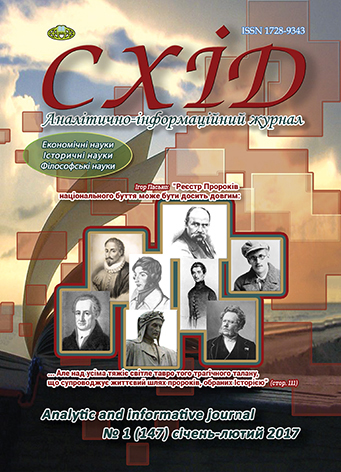Kuban Cossacks' songs as historical sources
DOI:
https://doi.org/10.21847/1728-9343.2017.1(147).96823Keywords:
historical songs, historical anthropology, Kuban, Ukrainians of North Caucasus, black Sea/Kuban cossack army, cossack dances, song tradition, historical sourcesAbstract
The present article aims to examine the Black Sea / Kuban Cossacks' songs as one of the most important historical sources, which allows us to understand the important aspects of the history of the North Caucasus Ukrainian people'. This is primarily due to the new challenges needed to study the evolution of their identity, certain features of the mentality, and "survival strategies" characteristic for the Ukrainian population in the region. New questions put by historians require expansion of sources where song tradition, folklore, etc., can become invaluable material for comprehension and interpretation of the new understanding of the history process. The authors have based on the fact that in recent times there have been a fundamental change of attitude towards scientific issues and accordingly to sources, which scientists were based on. Strict approaches and requirements to sources which historians relied on during the period of "positivism" have become much more flexible and spread to the analysis of art, culture and folklore of certain social groups and historical periods. It has become possible to find new approaches to solving problems of scientific research and expand the range of issues which can already be answered. One of the unexplored phenomena, yet barely covered in the domestic science is the history of Ukrainian communities of the North Caucasus (Kuban) area. The authors propose to consider the peculiarities of mentality of this community through the prism of song tradition of the Black Sea / Kuban Cossacks that played a crucial role in all spheres of life.
Besides, the features of song traditions of Ukrainian Cossacks (worth noting the important role of folk choreographic culture - Cossack dance) which react very quickly to current events of certain historical periods allows us to consider it as a very important indicator of community' response to new circumstances (social, economic, ideological) in which the community was. The approach enables us to view features of "history of mentalities" of the Ukrainian community in the region much more than focusing on official documents and political declarations.Downloads
References
Assmann, A. (1997), Gedächtnis, Erinnerung, in: Handbuch der Geschichtsdidaktik, Seelze-Velber, s. 33-37 (germ).
Assmann, A. (1994), Zum Problem der Identität aus kulturwissenschaftlicher Sicht, Die Form des Regionalen. Über neue Formen kultureller Identity, Frankfurt am Main, s. 13-35 (germ).
Konnerton, P. (2004), As society remember [translat.], Nicka Center, Kyiv, 184 p. (ukr).
Bigday, A.D. (1992), Song Kuban Cossacks, Vol.1 (Song of the Black Sea Cossacks), Book Publishing House, Krasnodar, 127 p. (rus).
Kosice, O. (1948), Memories, W.p., Winnipeg, 260 p. (ukr).
Suprun-Yaremko, N. (2005), Ukrainian Kuban and their songs, Musical Ukraine, Kyiv, 771 p. (ukr).
State Archives of the Krasnodar Region, Fond 1, spr. 499, arc. 10.
State Archives of the Krasnodar Region, Fond 396, op.1, spr. 10017, arc. 3.
Nyrko, O. (1994), Kobzarstvo of Kuban, Kobza and lyric tradition and its modern development: Proceedings of the conference. № 49-50, Dnipropetrovsk, p. 19-21 (ukr).
Chumachenko, V. (2005), Kuban in life and work of Simon Petliura, Bulletin of Donetsk Scientific Society. Shevchenko, Vol. 8, East Publishing House, Donetsk, p.85 (ukr).
Teliha, M. (2005), As I became conscious Ukrainian, in: Monuments, Ukraine: history and culture, № 3-4, pp. 91-100 (ukr).
Downloads
Published
How to Cite
Issue
Section
License
Copyright (c) 2017 Dmytro Bilyi, Taras Osadtsiv, Taras Shit

This work is licensed under a Creative Commons Attribution-NonCommercial-NoDerivatives 4.0 International License.
1. Authors bear responsibility for the accuracy of facts, quotations, numbers and names used.
2. Manuscripts are not sent back.
3. The publisher does not always agree with the authors' opinion.
4. The authors reserve the right to authorship of the work and pass the first publication right of this work to the journal under the terms of a Creative Commons Attribution-NonCommercial-NoDerivatives 4.0 International License. This license allows others to distribute (copy) the published work for non-commercial purposes, provided there is mandatory attribution to its authors and a link to the first publication in our journal.
5. The authors have the right to conclude separate supplement agreements that relate to non-exclusive work distribution in the form in which it has been published by the journal (for example, to upload the work to the online storage of the journal or publish it as part of a monograph), provided that the reference to the first publication of the work in this journal is included.

